Encouraging the Church in



Mobility is a reality for missionaries. One of the best skills a missionary parent can learn is how to guide their children through transitions.
A missionary mum shares her journey to find the right schooling for her two daughters, plus five principles that will help other parents beginning the same journey.
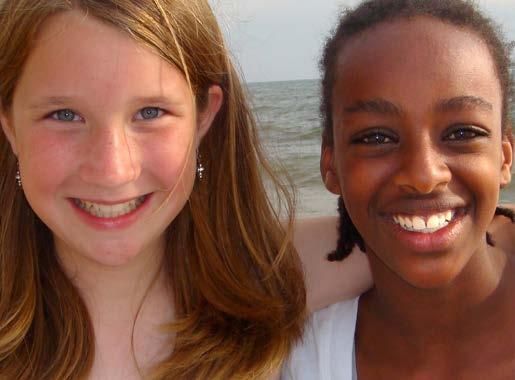
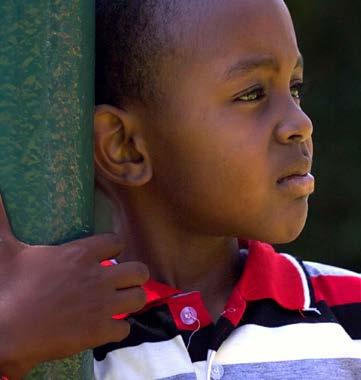
A missions director describes some of the blessings and challenges encountered by MKs, including language, multi-cultural mission communities, and education.

© 2019 AFRIGO
AFRIGO is a publication aimed at raising awareness, mobilising, training and inspiring churches and individuals in Africa towards global mission.
Editor: Mercy Kambura Mate Design: Pilgrim Communications
The views expressed in the various features in this magazine are not necessarily those of the publisher.
Stock photos are occasionally used. Pseudonyms are used when there are security concerns.
How can we better embrace our missionary kids, or MKs, into mission life? Of course, they are already in the mission, but they are in the mission because of their parents. It’s natural for us to give commands and expect children to follow without question.
My own children are young and were born after my wife and I became missionaries. They did not choose this life, but one day they will. They may own it or reject it, depending how I treat them. If I finish my missionary journey today, and my son and daughter do not see any good thing in it, what a disappointment that would be. Rather, I want to give them a compelling legacy. The question is, how can we, as parents, live such inviting lives that our children hunger to follow in our footsteps?
I have learned that the little things are so important. As adults, we think some things don’t really matter, but to a child, they do. For example, I scheduled a very important meeting with our team in a neighbouring country on the 16th of the month. However, the 15th
of the month was my son’s last day of school. I cancelled the travel and the meeting because I didn’t want to travel that day. I wanted to be present for my son during any events or parties with the other children. Our presence during such times will impact our kids in ways we may not know for years.
We must also be intentional with our children if we want to see the future of African missions flourish. If we do it wrongly, they may say, “You chose it, not me,” and may abandon it. But if they see what their parents are doing and choose to follow God, then we will be raising a new generation of missionaries and missions supporters. Even if they do not become full-time missionaries, they will love the work and become advocates and supporters of the Great Commission.
Let’s remember how Jesus moved to Egypt sometime between his infancy and toddlerhood. Through a dream, his heavenly Father instructed his earthly father, Joseph, to flee there. By the age of 12 we see Jesus at the temple, his family having transitioned back to Israel. Perhaps we can imagine how these formative years spent in a foreign culture
influenced his early development, his awareness of the whole earth, and his heart for the lost of all nations. I believe this missionary life is the best life I can give to my children because God called my whole family into it–children included. One day I want my children to say, “My heavenly Father and my earthly dad did not make a mistake.”
In this issue, you will hear from the Director of our East African Office some of the challenges and blessings of being an African MK, you will read how to plan transitions well for children using a RAFT, and you will hear the story of two MK sisters, Blessing and Joy, who are thriving today. My prayer is that you will come away with a broader view of these children, and that you will commit to pray for them even as you pray for missions in general.
Daniel Salamu is Director of SIM’s West Africa Missions Office, which mobilises and sends missionaries from 16 nations. Daniel and his wife are the parents of two MKs, a son aged 7 and a daughter aged 3. He is from Nigeria and currently resides in Ghana after serving over 8 years in Burkina Faso.
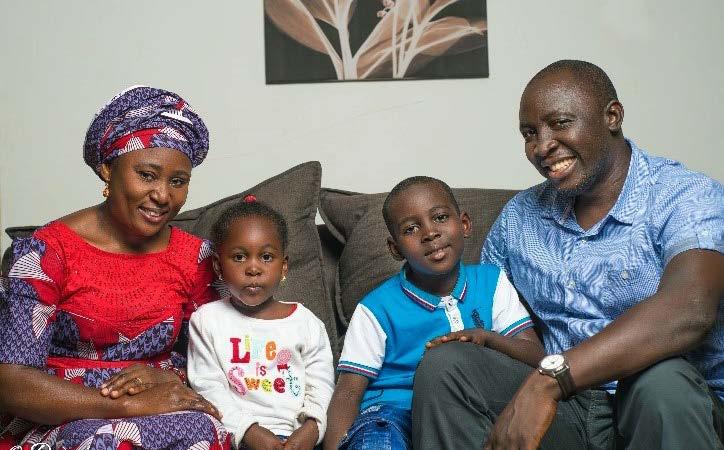
Missionary Kids are mobile. This is a reality for the children of missionary families.
MKs leave their country of origin and with it their aunties and uncles, grandparents and cousins, friends and schoolmates, and sending church. They resettle in new countries and, over time, revisit their home country. Sometimes parents are later re-assigned to another field and ministry. Even for MKs whose parents stay in one location,
other missionaries may come and go around them, meaning they frequently have to say hellos and good-byes.
One of the best skills a missionary parent can learn is how to guide their children through transitions, equipping them to say good-bye with whole hearts and to say hello with hopeful hearts, ready for a new chapter. Parents who are aware and wise can help to develop in their children resilience and coping skills that will serve them well for the rest of their lives.
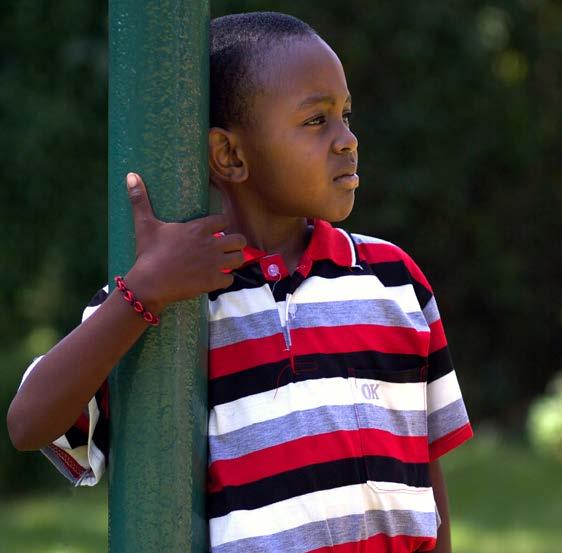
Imagine a wide stream with banks on each side. On one bank is the place your child lives now, and on the far bank is the place they will live next. The water between is the transition, and it can be navigated poorly, adequately or skillfully. Of course, unexpected storms can arise and complicate the crossing, but a well-thought-out transition plan will help a child fare better even when there are surprises.
The authors of the book Third Culture Kids: Growing Up Among Worlds suggest four steps that form the acronym RAFT. These steps help parents to intentionally plan transitions – building a sturdy RAFT to cross the stream to the far bank. The letters that make up this RAFT stand for reconciliation, affirmation, farewell, think destination.
• Age: What are the ages of your children? The younger they are, the easier it will be for them to adapt. For teenagers, changes can cause greater upheaval, so more preparation is needed.
• Schooling: What education options will be available for your children? Are there good local schools or international schools, or are boarding, distance-learning and home-schooling the main options? What are the costs of these education options and how will the costs be paid?
• Language: Will they need to learn new languages in the new place? What language will you speak in your home? Do you want them to be
fluent in your mother tongue? If so, this will require effort and dedication on your part as a parent.
• Friends: Will you be joining a missionary team and if so, do they have children, too? Will there be local children that they can befriend?
• Home: Where are you going to live? Will you be in an apartment or house, on a campus or in a neighborhood? Will your children have their own rooms?
• Medical Care: What medical care will be available in case of illness or accidents? Do any of your children have special health needs that require access to health services? How will you pay for health costs?
• Emergency: If there is a crisis–political upheaval, natural disaster, etc.–what is the emergency protocol?
Will your missions organisation, church or your country’s embassy help take responsibility for your safety during a time of crisis?
• Standard of living: What standard of living will you likely have in the new context, and will it be greater or less than what your children know currently? (Remember: standard of living is not the same as quality of life; the latter can be accomplished no matter what standard of living God may be calling you to.) How can you prepare your children to change

Reconciliation is about making things right in the relationships that will be left behind. It means working to resolve any misunderstandings or conflicts with others. To seek or to give forgiveness clears out the worries in a child’s heart and prepares them to take on new relationships in the next location. The tempting alternative is to box up the problems in one location and leave them behind. This doesn’t work; because each of us takes ourselves and our habits with us into new locations. Reconciliation is the first log in a sturdy raft that helps children develop skills for life. (Mark 11:25)
Affirmation means expressing appreciation for important relationships that will be left behind. What people and memories can be affirmed and treasured? Who can you and your child thank for their influence on your family? Be sure to take photos together, write thank you notes, or leave special gifts behind to remember each other. This step will help your child remember the good times and good people for a long time to come. This is the second strong log in the raft that will carry your child through a positive transition.
There was an orientation for new missionaries arriving to serve in Burkina Faso. The children in one family had been told by their parents that they could pick one or two special things from the previous country to bring to the new country. The parents promised to pack these things and take them to Burkina Faso. Do you know what one child picked? She picked stones from the ground! So, these important pebbles were packed and arrived with the luggage in Ouagadougou, as promised.
Farewell is the act of saying goodbye. It may sound too obvious to even mention, but in the rush of leaving, slowing down to say good-bye properly can be left for the very last minute. Good-byes that are rushed leave things unsaid and can feel unsatisfactory. Farewell is not only about special people, but also places such as their school or a favorite restaurant, events or traditions that they regularly knew, even farewell to things. Make a list of people, places and experiences for last-time visits, and create opportunities for this in the weeks before leaving. Host a good-bye party for your child’s friends. As parents who are busily planning the next steps, packing, and wrapping up ministry assignments, be sure to take time to get these farewells on the calendar. This is the third log in a solid raft to carry your child across a transition.

Think destination means to learn about and dream about the new location. Imagine with your children how it might be. Do research on the internet. Write down positives of the new location and what might be experienced and explored there. Help your child picture themselves in the new setting – in a new school, a new house; take practical steps to prepare for it. It is ok to feel excited about the new location even while feeling sad to say good-bye to a familiar and loved place. This is the fourth and final log in the complete raft that can carry your child across a transition from one location to the next.
Adapted from the book Third Culture Kids: Growing Up Among Worlds by Dave Pollock and Ruth Van Reken.
standards of living or to live in a context of diverse standards of living?
• Family: What close relationships do your children have with cousins, aunts or uncles? Do you desire to maintain and nurture some of these relationships from a distance? What is your plan for doing this?
• Treasured things: What items should your children take and leave behind? Every child has precious objects such as toys, games or certain clothes. The more you involve them in the choices about what to bring or leave, the more secure and in control they will feel.
My husband and I have two girls, Blessing and Joy. At the time we were preparing to follow God’s call into crosscultural missions in Thailand, our agency informed us that our assigned location had a homeschool teacher for the children of two families already serving there. We were encouraged that Blessing, eight years old at the time, would accompany us to the field and join this homeschool group. After seeking counsel and prayer, we determined that our older daughter, Joy, would stay with a relative in our home country to begin university. Although there was university education in Thailand, it was in the local language.
We arrived full of energy and soon became settled in the remote location.

Within several weeks of arrival, the
homeschool teacher left. No other teachers were in the pipeline.
The two families soon chose to relocate to the capital city where there was high quality schooling. My husband and I, both filling urgent leadership roles in the ministry location, prayerfully
arranged for Blessing to live with them and attend a homeschool group there, at an affordable rate and at a closer distance than the capital city.
I can tell you that while we earnestly sought the Lord in prayer, the two scenarios for our girls were not ideal. God’s grace has been abundant to us, and I can testify that both girls are doing well today. However, it was not a journey free of challenges.
sought out all the educational options we could imagine. Eventually another West African missionary family arrived in a town about four hours away. We
Our oldest, Joy, felt that our mission had “stolen” us from her. Living with our relative became quite strained to the point that my husband returned home to help sort it out. The season of a teenager’s life when they are launching out of the home into early adulthood is full of bumps, even in the best of circumstances. About two years later during a time of crisis in our home country, our mission went
God’s grace has been abundant to us, and I can testify that both girls are doing well today. However, it was not a journey free of challenges.
to great lengths to care for and protect our daughter. Through the mission’s response in this dangerous episode, Joy experienced their great love for her. Today we praise God that Joy is thriving young woman.

The arrangement for Blessing was quite positive, yet not without challenges. We gave her a phone to call us as often as needed. Her host family was truly hospitable and attentive to all her needs. But how should a host family discipline another person’s child to do schoolwork? Her academic performance was affected. Some discomfort or shyness is inevitable for a child living with another family. Even the warmest welcome could not help Blessing from sometimes thinking that maybe my parents to do not want me, a feeling that could not be further from the truth!
As parents, especially parents of MKs, we are always learning. Let me share some principles we gathered along the way: 1. Include your children in discussion about the changes ahead, what will happen, how it will happen. Even the very young have feelings, thoughts and opinions. Let them voice them.
2. Help your children through transitions. Not only your positive
attitude, but also allowing them to take an object that is special or comforting to them, gives a sense of security wherever they are.
4. The mission agency and sending church must be well informed of the schooling options. No matter how urgent or strategic a certain assignment is, the needs of the children are just as important.
3. Plan, plan, plan… then be prepared for surprises. In spite of the best plans, mission teams and mission resources can fluctuate from year to year. Your options one year may not be the same the next year.
• Within Africa, African MKs are often “hidden” because they blend in. Other missionaries and local people may not think they are MKs because they are not used to seeing Africans in that role.
• In African contexts, it’s typical for any adult present to intervene if a child is being naughty. In a mission context of predominantly Westerners, one should not discipline another family’s child.
• The family back home may not know how to fully accept your MK who has become different than their cousins and friends at home. Comments that mildly mock your child for not speaking their parents’ language well, not eating like them, and calling out other differences. Even in jest, these words can convey a subtle message to the MK about their differentness.
5. Living across cultures will shape, enrich and confuse your children. Help them to understand cultural differences and help them to respond confidently to comments from your family, local people, and missionaries of other nationalities. A verse for my children was I Peter 3:15, “Always be prepared to give an answer to everyone who asks you to give the reason for the hope that you have. But do this with gentleness and respect.”
Do not be so fearful you avoid God’s call to missions. Parenting is a challenge even if you stay home. Following God’s will for you and your family is always the best place to be. One of my favorite verses is Isaiah 30:21, “Whether you turn to the right or to the left, your ears will hear a voice behind you, saying, “This is the way; walk in it.”
If we seek God’s wisdom, plan well, and make ourselves present to our children during the challenges, then we have every hope they will grow into well-rounded and understanding individuals. And God will lead them into roles for which their unique crosscultural upbringing has prepared them. As one writer has said, “the bumps are what [they] climb on.” With your help, may your children climb high for God.
Do not be so fearful you avoid God’s call to missions. Parenting is a challenge even if you stay home.
 WORKU
WORKU
Wongel Mulugeta, Wongel (Gospel) Zeleke, William Cary, Ephrem Getachew–these are the names of some of our missionary kids (MKs) that represent the message of the gospel and the lives of missionaries. Through the names of their children, our missionaries remind themselves of their calling.
Preparing families and their kids for new fields is a challenge. It is vital for the sending church and mission to work together closely in the area of preparation, including expectations about the challenges ahead and how to tackle them together. In this way, some of the potential problems can be minimised. As it is, missionary families and their MKs are encountering challenges on both the sending and receiving sides–challenges that are emotional, financial, and social.
African MKs are typically expected to speak a minimum of three languages. MKs from our Ethiopian context speak Amharic, our national language. In addition, they learn the ethnic language of their
parents; an international language such as English, French, or Arabic; and finally, the national language of the country of service, such as Urdu or Chinese. In some cases, an ethnic language from the country of service is also added. Parents often prefer to use their ethnic language between them but use English or a local ministry language with their kids. However, others prefer to teach their children the parents’ ethnic language.
On one hand, children exposed to three or more languages during their early years will more easily acquire additional languages. On the other
Every missionary expects to live in a foreign culture, but the mixed culture of the multi-national missionary community can be a surprise. In some fields, the kids join very diverse communities with no clear minority or majority culture. However, in most places the African MKs are a minority ethnically and culturally. This dynamic can pave the way for loneliness and isolation, as reflected by an MK’s comment when his family returned to their home country for ‘home assignment’, “We wish to stay in our country so that we can have more friends here.”
hand, in the short-term, the presence of so many languages can cause delays in education because mastery of the language of education is incomplete.
Lack of finances is always the primary issue in children’s education. An expectation of the sending church and the extended family of the missionaries is that MKs will be able to access higher quality education outside their home country. They assume that wherever the mission serves, good schooling is available. However, this is not always the reality. A second assumption from the sending church is that the cost of children’s education is manageable. However, this is also not the reality.
Despite the high cost of doing mission work, especially children’s education, I can testify that some African churches are supporting their missionaries with great sacrifice.
While on one hand, missionaries struggle to pay for their children’s education; on the other hand, churches are truly struggling to add any more financial support. As a result, missionary parents carry the additional burden of finding ways to raise needed funds for their kids, an overwhelming endeavor that can cause worries and distress.
African missionaries are not familiar with home schooling and home schooling is often not recognised in their country.
Despite the high cost of doing mission work, especially children’s education, I can testify that some African churches are supporting their
missionaries with great sacrifice. They are not supporting according to how “affordable” it is for them. Rather, as Paul puts it in 2 Corinthians 8:3: “For I testify that they gave not only what they could afford but far more, and they did it of their own free will.” I have seen that some of the supporting churches, though their church buildings are in poor condition and there are other priorities, are devoted to giving first priority to missionary support.
All of this said, as we have made field visits to missionaries sent from our East African Office, we have observed amazing potential and resiliency among our MKs. Some may become missionary
pilots, cross-cultural ministers, and teachers of other MKs. We could produce a second generation of missionaries.

Worku Hailemariam is the Director of SIM’s East African Office in Addis Ababa, Ethiopia, serving since 2012. This office mobilises, orients, and sends missionaries from East Africa to serve across the globe. Ethiopian churches have been sending missionaries since the 1990s.
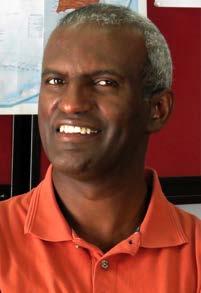
International missions work must be financially sustained, and African churches and businesses have a Godgiven responsibility to make that happen.
That is the key message behind Mission Invest Africa (MIA), which its organisers say is the first such initiative on the continent.
MIA’s inaugural two-day conference was held in early August at Johannesburg, South Africa’s University of the Witwatersrand. It drew together nearly 100 people–African entrepreneurs, businesspeople, church leaders, and representatives from both local and international missions agencies. Together they looked in-depth at the need for “gospel patrons” from within Africa who will provide the financial resources needed for global missions work.
After years of close association with several Christian ministry organisations in Africa, MIA founder Septi Bukula said he’s very impressed and excited by what God is doing.
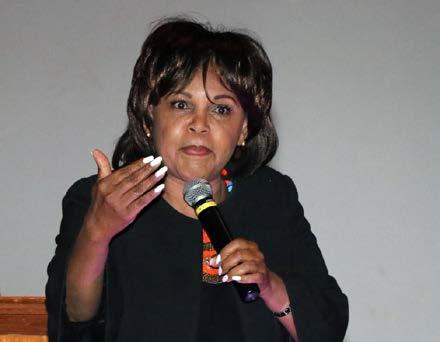
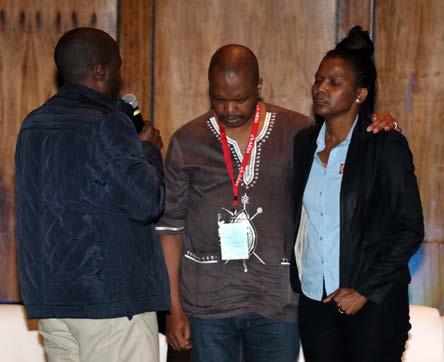
However, as both a Christian and an entrepreneur, Bukula says, “the biggest cry of my heart has always been to God, ‘Why is it that these ministries that are doing such great work and touching lives across the continent, and really changing destinies, are so often struggling in terms of (financial) resources?’”
In light of that, Bukula asked God for an “assignment”: to see how he could help. He desired to be both an advocate in the business community and a strategic planner, helping organisations to present their goals effectively to potential investors.
“I’ve been exposed to this need, if we can call it that, and it’s translated into a personal burden both to see the gospel being preached on the continent, but to also see these ministries, that God has entrusted… with that calling, being resourced,” Bukula said.
Speakers at MIA’s inaugural event discussed the history of missions in Africa, and the impact of financial generosity on the advancement of God’s Kingdom–from Western churches supporting missionaries in Africa, to African Christians dedicating resources to send their own missionaries across the globe.
Pearl Kupe, a Johannesburg entrepreneur, referred to Matthew 5:13 when she said, “The saltiness of who you are is reflected in what you do in your community.” She gave one of several testimonies on generosity towards missions.
Attendees were introduced to different facets of missions work, including gospel proclamation, television ministry, and outreach
Have you ever wondered how others in Africa are connecting with the Global Church in the world of missions? Have you ever desired to partner the strengths of your organisation with the strengths of another for greater kingdom impact, but don’t know who else shares your passion and how to connect with them? Today there is a great resource for you.
Linking Global Voices is an online resource where you can discover networks of individuals and ministries. Here you can search for global networks based on a topic or a geographical location. Brief descriptions are provided for each network, along with links to their websites. You can also discover past and upcoming events hosted by networks.
If you are a leader of a network of different ministries and organisations that shares a common interest, then Linking Global Voices would like to hear from you. Your network
work amongst university students, politicians, and in the marketplace.
SIM and other agencies are preparing to send workers, but those workers must be financially supported to do that work effectively. SIM’s Southern Africa director, Siegfried Ngubane said, “Some people whom God has called, they will be released by your and my generosity.”
Learn more: https://www.facebook.com/ www.missioninvestafrica.osiba.co.za/
can be listed. You can create your own network leader profile, which will give you access to connect with the leaders of other networks.
Check out Linking Global Voices today at http://linkingglobalvoices.com/.

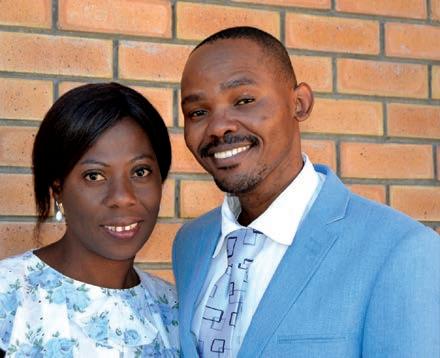
The Africa Evangelical Church (AEC) of Botwana is sending its first missionaries. Sydney and Keneilwe Berman will serve in the town of Cochabamba, Bolivia, South America. Sydney pastors an AEC church in Gaborone as they prepare for this divine assignment.
The Bermans first became interested in missions in 2014 when a missionary couple invited them to prayerfully consider being missionaries, fanning a desire they already had. They regularly read missionary newsletters and prayed for them; but that was as far as it went. Two years later, the Macedonian call came again. The Bermans prayed again, and the Lord led them to take a leap of faith. They applied with SIM and were accepted.
Sydney holds a Bachelor of Theology, a master’s and doctorate in Old Testament interpretation, focusing on the Hebrew and Tswana versions of the book of Ruth. He has previously pastored a church in Tonota town, lecturing Hebrew at the University of

The reality on the ground for Chinese house churches has changed since the 19th National Congress of the Communist Party of China (CPC), held in the nation’s capital of Beijing, in October 2017. Since the new religious laws took effect February 2018, house church leaders are facing harassment, surveillance and raids.
Yanan Wang of the Associated Press writes, “Under President Xi Jinping, China’s most powerful leader since Mao Zedong, believers are seeing their freedoms shrink dramatically even as the country undergoes a religious revival.”
House churches must either join the state church, called the Three-Self Patriotic church, or be registered as independent churches. Registration requires that surveillance cameras be installed in places of worship or the church faces punishment for violating state law.
Some house churches have decided to go further underground rather than comply with these conditions. Some are breaking into smaller groups to avoid public attention.
Wang adds that there are “an estimated 67 million Christians, including Catholics–a number that is expected to swell to become the world’s largest Christian population in a matter of decades.”
This religious policy change at a national level affects the ministries of African missionaries in China. All continue to be gospel carriers while keeping low profiles. Pray for an African missionary leading a team under these restrictive conditions.
Learn More: Christian heartland opens window into fight for China’s soul: https://bit.ly/2DkV8kk (AP) Voice of the Martyrs: https://vom.com. au/?s=china+house+church
Botswana, and later at North West University in South Africa. Keneilwe began as a secretary in a private firm, later joining her husband for the pastorate. She is the nurturer of the Berman family. Their eldest child studies at the University of Botswana and will not join the family in Bolivia. Their two sons are learning Spanish in preparation for schooling in Bolivia.
Although the Berman family is eagerly awaited in Cochabamba, they still need many friends to partner with them in prayer and financial support. This is a great opportunity for the body of Christ to become part of world missions by standing with the Bermans! Contact AfriGO_English if you would like to be in touch with them.
Do you have questions about this issue’s theme or other missions topics? What subjects would you like AfriGO to cover? We welcome your input in order to make the magazine relevant and comprehensive. Please email info@afrigo.org with your questions and ideas.

Missionary Kids, referred to as MKs, have been part of the history of missions since the age of Modern Missions began in the late 1700s. But until recent decades, their unique characteristics and roles in missions have been little understood and largely unrecorded. Today their contributions, their unique life experiences, and their beneficial qualities are much better known and understood.
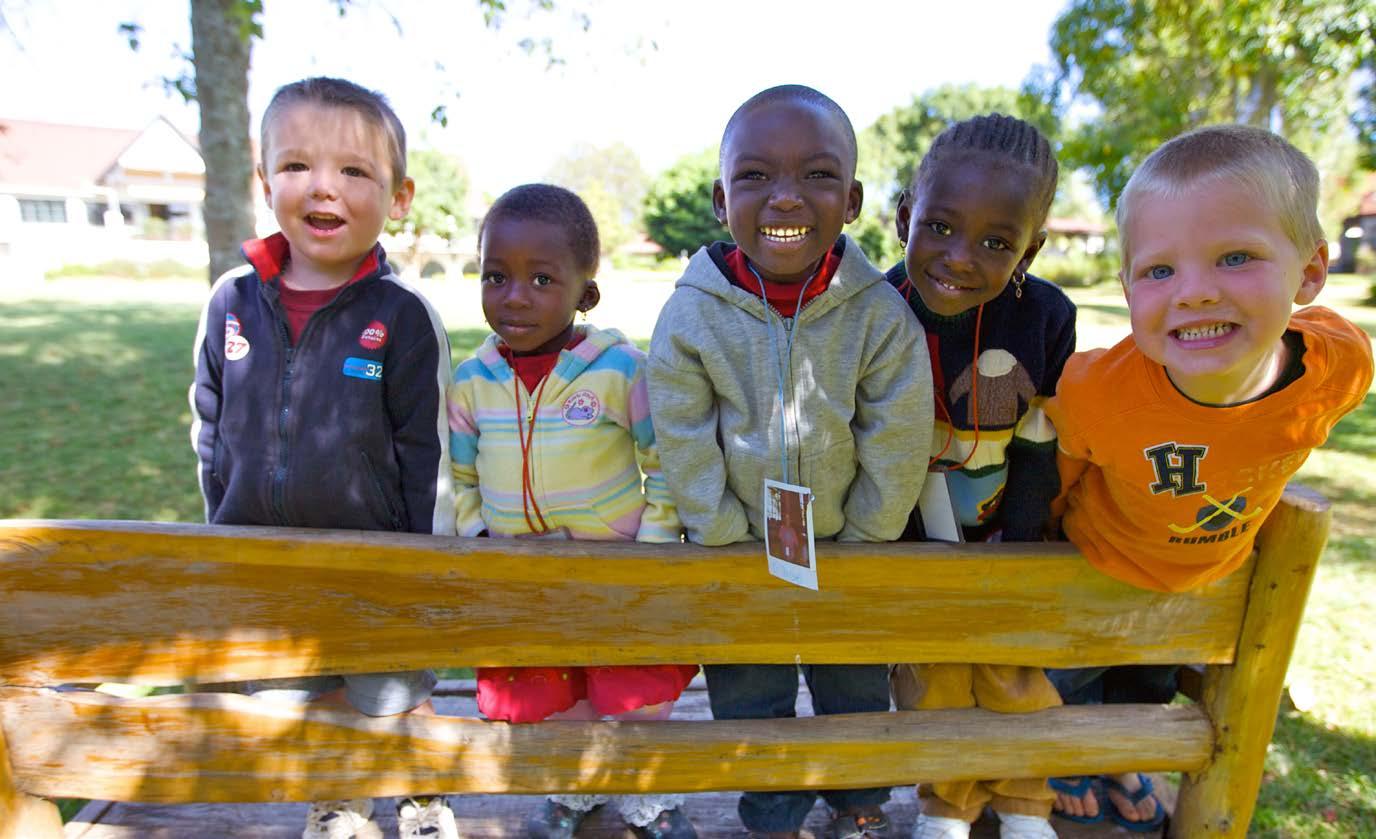
MKs’ exposure to other cultures and peoples uniquely equips them to influence their world as adults. Many MKs become leaders in the church, in ministry and in the world. Henry Luce was born to missionary parents in China in 1898. As a young adult he founded Time magazine–the first of its kind and still today the world’s most widely circulated weekly news magazine. The perspectives he gained in his childhood impacted his vision for an international news publication.
A new term, Third Culture Kids, was coined in the 1950s by researcher Ruth Useem. “A Third Culture Kid is an individual who, having spent a significant part of their developmental years in a culture other than their parents’ home culture, de velops a sense of relationship to all of the cultures, while not having full ownership in any. Elements from each culture are incorporated into the life experience, but the sense of belong ing is in relationship to others of similar experience.”* TCKS include MKs as well as the children of business people, diplo mats, and other international workers.
Many adult MKs embrace their upbringings, with their blessings and challenges, and the unique experiences that have formed them. They continue to love and serve the Lord wherever they are. But like all children of Christian parents, they can choose to walk away from faith. Even the best of par ents and community cannot guarantee their future choice.
• MKs are part of a larger group called Third Culture Kids (TCKs) – kids who develop a “third culture” that is distinct from the cultures of their parents and their host country.
• MKs gain skills to function well in many cultures.
• MKs can feel bonded to many homes, yet may struggle without a sense of one home to go to.
”Definition
• Give insight to missionary parents raising their children.
• Grant good planning to mission and church leaders in how to help whole families step into a Great Commission calling.
• Help MKs amidst transitions between countries, ministry locations and schools.
• Bring back to himself MKs who are not following Him.
Van
SIM East Africa

SIM West Africa
SIM Southern Africa
AIM International